Tehran, Baghdad Agree To Disarm And Move Iranian Dissidents In Iraq

Iran and Iraq have formalized an agreement to dismantle Iranian Kurdish dissident factions stationed in the northern reaches of Iraq and relocate them from their bases.

Iran and Iraq have formalized an agreement to dismantle Iranian Kurdish dissident factions stationed in the northern reaches of Iraq and relocate them from their bases.
Nasser Kanaani, spokesperson for Iran's Foreign Ministry, explained the details of the agreement during a press briefing, stating that the Iraqi government had undertaken the commitment "to disarm the armed terrorist groups stationed in Iraq's territory by September 19, and subsequently, evacuate and transfer them from their military bases to camps designated by the Iraqi government."
Kanaani stressed that the stipulated deadline would remain non-negotiable. Despite characterizing the relationship between the two countries as "entirely friendly and warm," he acknowledged that the presence of these dissident groups in northern Iraq had cast an undesirable shadow on mutual diplomatic ties.
Historically, Iran has intermittently executed targeted operations against the Kurdistan Democratic Party in Iran (KDPI) and other Iranian Kurdish dissident elements operating within Iraq's semi-autonomous Kurdish region, adjacent to Iran's borders.
Various Iranian dissident factions in Iraq have aligned their allegiances with the two principal Iraqi Kurdish parties: the Kurdistan Democratic Party, headquartered in Erbil, and the Patriotic Union of Kurdistan party, with its stronghold in Suleimaniyah.
Iraqi Prime Minister Mohammed Shia al-Sudani, who assumed his role via a coalition of Iranian-backed political entities last year, is widely perceived to share close alignment with Iran although he has also attempted to build ties with the United States and Turkey.
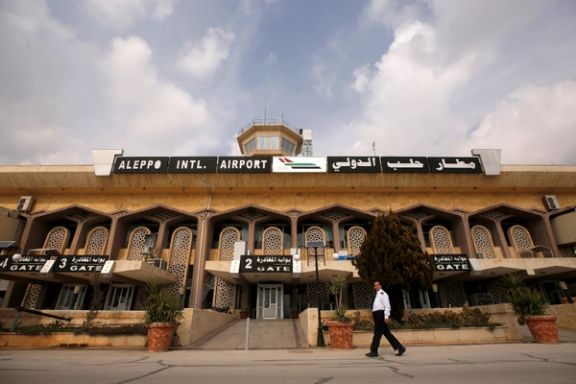
The Aleppo International Airport has been left inoperable following what the state news agency SANA has attributed to an Israeli airstrike.
Citing an official from the Syrian military, SANA reported that Israeli aircraft, originating from the Mediterranean Sea, carried out the attack at approximately 4:30 am, Monday.
Whilst No casualties have been reported, the incident marks one of several attacks on the airport this year, including two strikes in March that also resulted in its temporary closure.
Israeli officials have yet to issue an immediate comment or acknowledgment about today’s event but the country has carried out a series of strikes on targets within government-controlled areas of Syria in recent years. While these operations predominantly focus on military installations or Iranian-backed factions, Israel rarely confirms or discusses its actions. It is believed that these targeted operations aim to intercept arms shipments from Iran destined for militant groups supported by Tehran, including Hezbollah in Lebanon.
Over the course of Syria's 12-year-long conflict, thousands of Iran-backed fighters from across the region have joined the conflict, contributing to the advantage of President Bashar Assad's forces.
Aleppo, which suffered substantial damage during the Syrian civil war, experienced further destruction following a powerful 7.8-magnitude earthquake that struck Turkey and Syria in February and also greatly damaged the city's infrastructure.
Reports have also emerged from The Washington Post, citing classified US intelligence, that Iran had covertly dispatched weapon shipments to Syria under the guise of humanitarian aid. These alleged actions were said to have occurred in the wake of the earthquake and were intended for use against US forces.
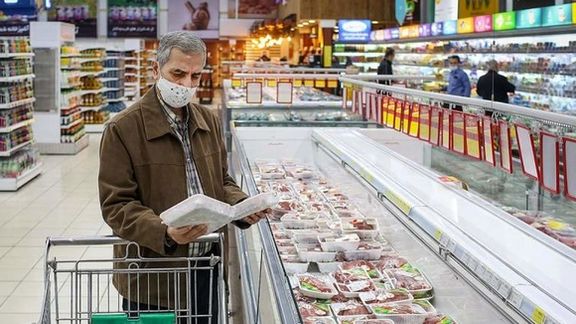
Despite pervasive poverty in society, the Iranian government boasts about its performance but based on apparently fabricated data, a former official says.
To justify its inept handling of the economic situation, manifested in devaluation of the national currency and runaway inflation, the administration of President Ebrahim Raisi is falsifying statistics pertaining to the government of Hassan Rouhani to pretend there has been growth under his stewardship.
The sheer volume of inaccurate information has prompted Mohammad Bagher Nobakht, a vice president under Rouhani and the former head of the Planning and Budget Organization, to write an open letter to the incumbent, providing what he described as the correct data.
He pointed out that the current administration claims the average annual inflation rate was about 60 percent in July 2021 to justify the current figure of about 47 percent, but the real figure reported by the Statistical Center of Iran at the time was 45 percent.
Iran’s point-to-point inflation rate was about 64 percent in March, a figure only recorded twice since World War II. Then the government changed the “base year” from the Persian year 1395 to 1400, which ended on March 20, 2022. The new base year -- used for comparison in the measure of a business activity or economic or financial index – resulted in new figures at about 45 to 50 percent.
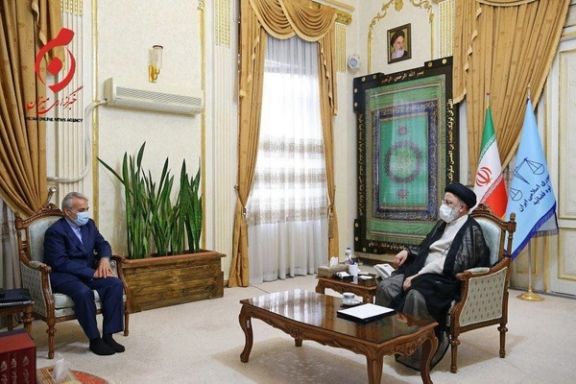
Nobakht added that the economic growth rate of the country was also about three to four percent in the last year of Rouhani’s term and not the 0.4 percent that the current government claims. He also provided official reports by the Central Bank of Iran and the Statistical Center to back up the figures he cited. It should be noted that the numbers by the two government organizations are different from each other and also different from that of the World Bank. Moreover, the current administration puts the average economic growth rate of its first two years at 4.8 percent, but the World Bank says the growth rate in 2022 was 2.7 percent.
“It is not possible to create an acceptable performance record for governments through comparing selective and unscientific economic indicators,” Nobakht noted, highlighting that the people will judge the success of the current government based on its announced commitments, such as the annual creation of one million housing units, one million jobs, reducing the inflation rate to less than 10 percent, and efforts to lift US sanctions.
Reacting to the letter, the official news agency of the government, IRNA, published two articles on Monday and Tuesday claiming that when the current administration took office, it inherited a huge burden of unsettled debts from previous administrations. However, according to a report in July, the current administration has been aggressively borrowing from quasi-public banks to fill its budgetary gap and keep its unprofitable companies afloat.
IRNA claimed that the remarks by Nobakht are in line with former officials’ attempts to justify their performance so that they can have a chance in the upcoming parliamentary elections.
Against the backdrop of political rivalries that are intensifying ahead of the elections, Iranian people are the ones who bear the brunt of the country’s inflation and currency devaluation no matter which officials hold office. The first years of Rouhani’s term coincided with the 2015 nuclear deal with world powers that led to removal of most sanctions and boosted the economy. But after the US withdrawal from the JCPOA and reimposition of sanctions, the country’s economy was on a nosedive.
The Islamic Republic has been struggling with high inflation since at least 2019, but the raging inflation in the past Iranian year which ended on March 20, was seriously different from previous years. The inflation rate factors in numerous commodities and services but the one most important for Iranians is increasing food prices, with some categories doubling or tripling in the past 12 months. Official figures show there was a sharp increase in food prices and most items witnessed a more-than 50 price inflation. The devaluation of Iran’s rial from 260,000 per US dollar to about 500,000 this year signals even higher economic woes for the people.
According to a report in Aftab News website, affiliated with reformists, in the past two years, the overall inflation for essential household needs was over 250% while the minimum wage has only increased 27%, quipping that the deputy labor minister calls this “an achievement” of the Raisi administration.
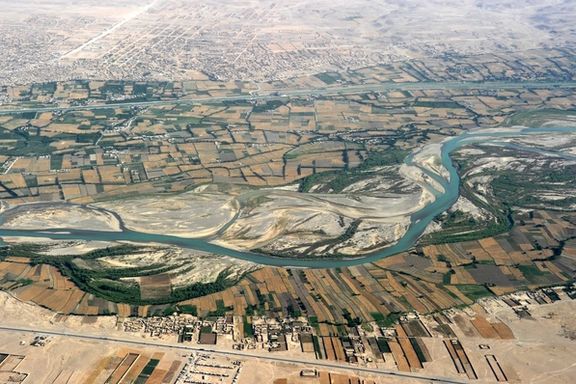
An Iranian parliamentary delegation has visited Kabul to address the water crisis in Sistan and Baluchestan stemming from the Taliban's Helmand River flow obstruction.
During their visit to Afghanistan, the delegation met with the Taliban's Foreign Minister, to address the problem of lack of proper water sharing from the river as well as additional security issues. The delegation said that Iran is willing to share its "various experiences" with the Taliban.
According to the Taliban's Ministry of Foreign Affairs, the seven-member delegation, led by Javad Karimi-Qoddousi, met with Amir Khan Muttaqi, the Acting Foreign Minister of the Afghan Interim Administration.
Hafiz Zia Ahmad, the spokesperson for Afghanistan's Ministry of Foreign Affairs, stated that in the meeting, both sides engaged in detailed discussions on topics including "security, combating narcotics, preventing smuggling, border protection, and trade."
Iran says that the Taliban have restricted water flow from the Helmand River to Iran's parched eastern regions, but this accusation is denied by the Taliban.
A particular point of contention between the Iranian officials and the Taliban surround the crossing of hundreds of thousands of Afghan refugees across the borders, and the increase in cultivation and transit of narcotics.
These differences led to clashes between Iranian border forces and the Taliban in a border outpost area in the Zabol border region in late May, resulting in casualties among Iranian border guards. However, Iran's Foreign Minister stated that the actions of the Taliban forces in this conflict were "unjustified."
Some members of the Iranian parliament, including Ahmad Naderi, a representative, had previously referred to the Taliban as "one of the authentic movements of the region with a Pashtun ethnic background" before their return to power, emphasizing that "collaboration with the Taliban could lead to the expansion of stability in Afghanistan and prevent the infiltration of groups like ISIS."
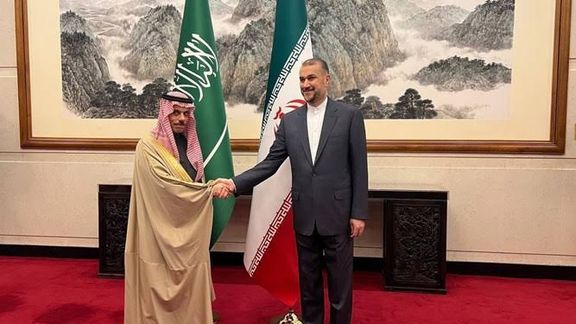
Efforts to address the hosting predicament surrounding the matches involving Iranian and Saudi Arabian football teams have been undertaken by the foreign ministers of both nations.
Since 2016, matches between representatives from Iran and Saudi Arabia in the Asian Champions League have been conducted on neutral territory, as mandated by the AFC executive board. Recent developments, however, have given rise to speculation about potential alterations to this arrangement.
According to reports, the Asian Football Confederation has initiated communication with the football federations of Iran and Saudi Arabia, with the aim of collaboratively designating a host location in a third country.
Mehdi Taj, the head of the Iran Football Federation, revealed during a sideline conversation at the Football Board Assembly that "Iran's Foreign Minister engaged in discussions with his Saudi Arabian counterpart to address the issue of holding matches between the two countries' representatives on neutral ground."
In contrast, Reza Darvish, the CEO of Persepolis football club, expressed his club's rejection of the directive received from the federation to select a host for Al-Nasr FC. He further communicated that Persepolis club is actively communicating with the football federation through correspondence, with the goal of retaining the privilege to host the match in Iran.
These negotiations occur against the backdrop of a significant diplomatic rapprochement facilitated by China in March. This initiative brought an end to years of animosity between Iran and Saudi Arabia, which had strained regional stability in Yemen, Syria, and Lebanon. On June 7, 2023, Iran formally reopened its embassy in Saudi Arabia, marking a pivotal step towards the restoration of diplomatic relations.
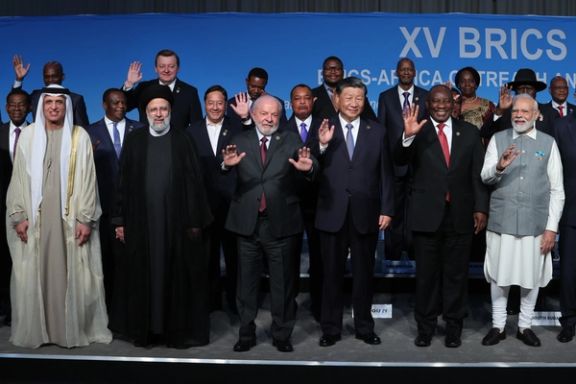
Amid Islamic Republic's international isolation, a few individuals with close ties to the regime appear optimistic about the country's recent inclusion in BRICS.
However, observers and experts in Tehran are starting to question the significance of this membership, particularly its unclear economic implications that Iranian officials have yet to elucidate.
There have been numerous social media posts about President Ebrahim Raisi's incoherent mumbling upon his return from South Africa at Tehran's airport. It can hardly be translated into any language including Persian, as it sounds like Greek to anyone, including Persians.
Nour News, a media outlet linked to Iran's Supreme Council of National Security, has offered this seemingly sophisticated explanation in a Threads post: "Six new members have been added to BRICS from the continents of America, Asia, and Africa. With these additions, 45 percent of the world's population and the owners of more than 30 percent of the world's gross product are now part of this alliance. This development signifies the breakdown of the old order that was rooted in geopolitics and the rise of a new order founded on geoeconomic cooperation."
The numbers, whatever practical implications they hold for Iran, are primarily driven by the substantial populations of India and China. However, the potential benefits of these figures for Iran remain uncertain, especially while the US sanctions are still in effect.

Kourosh Ahmadi, a former Iranian diplomat at the United Nations told Entekhab website in Tehran, " We cannot hold any hope of benefiting from the financial resources of BRICS as long as US sanctions remain in place," he emphasized. He went on to add, "Iranian officials must not be consumed by illusions regarding membership in the Shanghai Cooperation Organization and BRICS. Should they fall into such illusions, their membership could prove more detrimental than not being members at all"
Ahmadi pointed out that BRICS members decided to magnify the alliance's importance after several years of disputes particularly between India and China. India had concerns about the possible anti-Western tendency of BRICS. Ahmadi further noted that some of the pro-West and pro-East countries invited to the South Africa summit, were not interested in becoming members.
The interactions between the leaders of China and India were notably less than friendly. In contrast, while Saudi Arabia was granted membership, Riyadh expressed its intention to deliberate on the issue. Evidently, Riyadh does not share Iran's urgency to forge alignments with either China or the United States.
Ahmadi expressed doubt that, in the long run, expanding the number of its members would necessarily elevate the significance or influence of BRICS, and added, "I can hardly contain my laughter when I hear Iranian officials suggesting that BRICS will undermine the international dominance of the US dollar."
According to Entekhab it is doubtful that Iran could benefit from its BRICS membership without finalizing the negotiations with the United States and Europe over the 2015 nuclear deal (JCPOA). Ahmadi defined BRICS simply as "a forum for dialogue." He added that it even lacks a secretariat and a charter. Its founders defined it as "a way to promote dialogue and cooperation between the member states." He further added: "It is something like the Non-Aligned Movement."
Ahmadi reiterated that "Iranian officials should understand that without sorting out the nuclear issue through negotiations and without accepting the terms of the Financial Action Task Force (FATF), membership in organizations like BRICS or Shanghai cannot help Iran."
Regarding the Iranian government's propaganda, he said: "The government has every right to promote itself, but independent and knowledgeable individuals are also free to accept or dismiss it."






